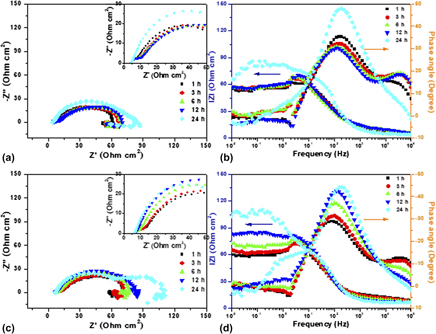Crossref Citations
This article has been cited by the following publications. This list is generated based on data provided by
Crossref.
Ghanbari, Arezoo
Warchomicka, Fernando
Sommitsch, Christof
and
Zamanian, Ali
2019.
Investigation of the Oxidation Mechanism of Dopamine Functionalization in an AZ31 Magnesium Alloy for Biomedical Applications.
Coatings,
Vol. 9,
Issue. 9,
p.
584.
Khosravi, Fatemeh
Nouri Khorasani, Saied
Rezvani Ghomi, Erfan
Kichi, Mohsen Karimi
Zilouei, Hamid
Farhadian, Mousa
and
Esmaeely Neisiany, Rasoul
2019.
A bilayer GO/nanofibrous biocomposite coating to enhance 316L stainless steel corrosion performance.
Materials Research Express,
Vol. 6,
Issue. 8,
p.
086470.
Fuchs-Godec, Regina
Tomic, Milorad V.
and
Pavlovic, Miomir G.
2019.
Effect of α-tocopherol as a green inhibitor on chloride-induced corrosion of steel.
International Journal of Electrochemical Science,
Vol. 14,
Issue. 11,
p.
10396.
Tiyyagura, Hanuma Reddy
Kumari, Suman
Mohan, M.K.
Pant, Bhanu
and
Nageswara Rao, M.
2019.
Degradation behavior of metastable β Ti-15-3 alloy for fastener applications.
Journal of Alloys and Compounds,
Vol. 775,
Issue. ,
p.
518.
Soleymani, Farzad
Emadi, Rahmatollah
Sadeghzade, Sorour
and
Tavangarian, Fariborz
2019.
Applying Baghdadite/PCL/Chitosan Nanocomposite Coating on AZ91 Magnesium Alloy to Improve Corrosion Behavior, Bioactivity, and Biodegradability.
Coatings,
Vol. 9,
Issue. 12,
p.
789.
Wu, Weiwei
Wang, Ziyuan
Zang, Sitian
Yu, Xiaoming
Yang, Huazhe
and
Chang, Shijie
2020.
Research Progress on Surface Treatments of Biodegradable Mg Alloys: A Review.
ACS Omega,
Vol. 5,
Issue. 2,
p.
941.
Akbarzadeh, Fatemeh Zahra
Ghomi, Erfan Rezvani
and
Ramakrishna, Seeram
2022.
Improving the corrosion behavior of magnesium alloys with a focus on AZ91 Mg alloy intended for biomedical application by microstructure modification and coating.
Proceedings of the Institution of Mechanical Engineers, Part H: Journal of Engineering in Medicine,
Vol. 236,
Issue. 8,
p.
1188.
Pawłowska, Alona
and
Stepczyńska, Magdalena
2022.
Natural Biocidal Compounds of Plant Origin as Biodegradable Materials Modifiers.
Journal of Polymers and the Environment,
Vol. 30,
Issue. 5,
p.
1683.
Moaref, R.
Shahini, M.H.
Eivaz Mohammadloo, H.
Ramezanzadeh, B.
and
Yazdani, S.
2022.
Application of sustainable polymers for reinforcing bio-corrosion protection of magnesium implants–a review.
Sustainable Chemistry and Pharmacy,
Vol. 29,
Issue. ,
p.
100780.
Venkateswarlu, B.
Sunil, B. Ratna
and
Kumar, R. Sunil
2023.
Magnesium based alloys and composites: Revolutionized biodegradable temporary implants and strategies to enhance their performance.
Materialia,
Vol. 27,
Issue. ,
p.
101680.
Verma, Akarsh
and
Ogata, Shigenobu
2023.
Magnesium based alloys for reinforcing biopolymer composites and coatings: A critical overview on biomedical materials.
Advanced Industrial and Engineering Polymer Research,
Vol. 6,
Issue. 4,
p.
341.
Amukarimi, Shukufe
Mobasherpour, Iman
Abdollahi, Sorosh
Brouki Milan, Peiman
and
Mozafari, Masoud
2023.
Synthesis and characterization of ciprofloxacin-loaded biodegradable magnesium implants for the prevention of implant-associated infections.
Materials Chemistry and Physics,
Vol. 299,
Issue. ,
p.
127530.




